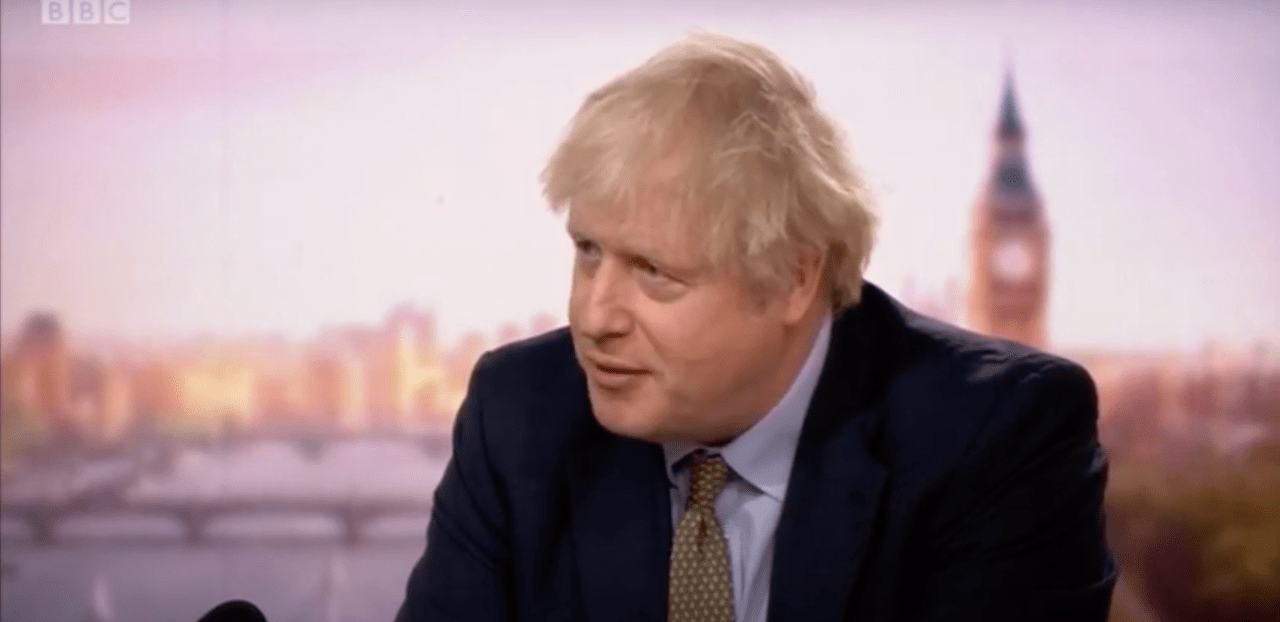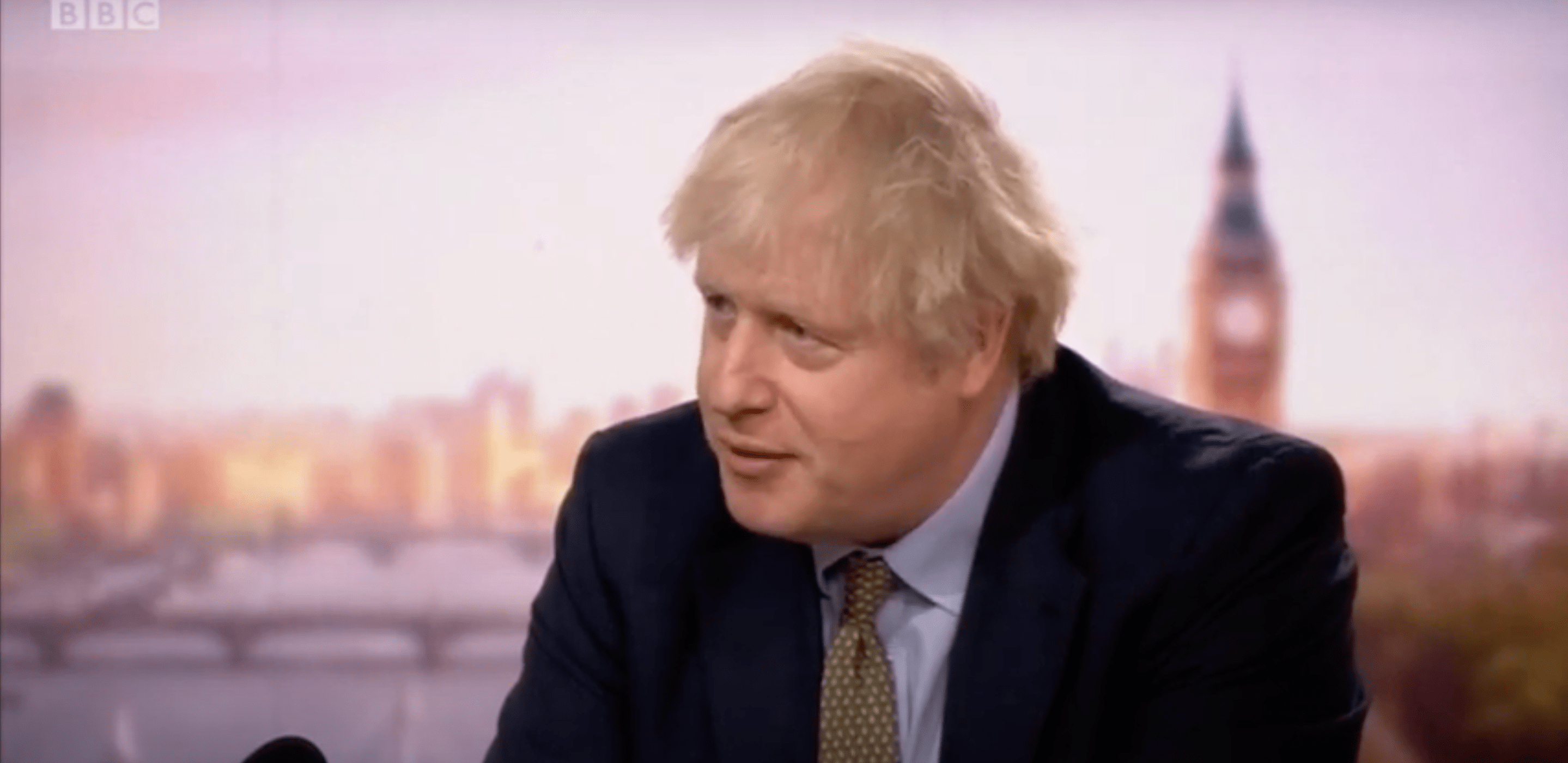Boris Johnson – Restrictions ‘probably about to get tougher’
The Andrew Marr Show returned this morning, and with it came an in-depth interview with the Prime Minister. It will surprise no one to hear that the bulk of the interview focused on the coronavirus, and Boris Johnson signalled throughout that the new year could see fresh restrictions being brought into place. He did not go into any detail about what measures could be introduced under a potential ‘Tier 5’, but it was clear enough that his 5pm Downing Street press conferences were not yet a thing of the past:
BJ: It may be that we need to do things in the next few weeks that will be tougher in many parts of the country. I’m fully fully reconciled to that, and I bet the people of this country are fully reconciled to that… Alas, [the tiering system] is probably about to get tougher, but we’ll review it.
Damage from extended lockdowns ‘would have been colossal’
Marr confronted Johnson about the government’s reluctance to take stricter measures earlier, in light of the new strain which has emerged in the south east of England and is spreading fast across the country. Johnson defended the government’s approach and downplayed a report from July which had warned about the possibility of such a mutation occurring:
BJ: You could have spent the entire year in lockdown… However, the damage to peoples’ mental health, the damage to the long term prospects of young people growing up in this country, the exacerbation of the gap between rich and poor – that would have been colossal… We could not have reasonably predicted that the virus [mutation] would be spreading 50 – 70% faster.
Primary school children should ‘absolutely’ return to school
Johnson stressed the message that schools were safe for children to attend across the vast majority of the country, although there are some exceptions, such as in London and some surrounding areas where the levels of viral transmission are particularly high:
AM: Should parents of primary school children in England, send them to school tomorrow morning?
BJ: Yes, absolutely they should in the areas where schools are open… Schools are safe… the risk to young people is very very small indeed, as the scientists continually attest. The risk to staff is very small, and of course, the benefits of education are so huge.
‘We have to be realistic’ about exam cancellations
Marr also asked about the likelihood of GSCE and A Level exams being cancelled again in 2021. Last year’s emergency measures resulted in a significant headache for the various governments across the UK when students had to be assigned a grade based on previous performance. Johnson did not directly answer the question, suggesting that it was indeed on the cards if transmission did not decrease fast enough:
BJ: In principle, it’s a good thing to keep schools open if we can…. We’ve got to be realistic about the pace at which this new variant has spread and is spreading… [and] the impact that it is having on our NHS.
Referendums should be ‘once in a generation’ events
One issue that may begin to push the coronavirus off centre stage is this year’s Scottish elections, and with it, the strong chance that the SNP will be in a position to push for another independence referendum. It is likely that the government will continue to refuse all such requests from the Scottish government for the foreseeable future. Marr asked Johnson to justify this position to a hypothetical Scottish voter:
BJ: Referendums in my direct experience in this country, are not particularly jolly events… They should be only once in a generation… We had a referendum [on Brexit] in 1975, and we then had another one in 2016. That seems to be the right sort of gap.
Mark Walport – Schools may have to close
Marr was also joined by Sir Mark Walport, formerly the Chief Scientific Officer and an adviser to the government’s SAGE committee. Walport urged that the tier system should be tightened beyond Tier 4, telling Marr that he felt closing schools might need to remain on the table:
MW: We now have a much more transmissible variant… It’s transmitting more readily in younger age groups as well… It is going to be very very difficult to keep it under control without tighter social distancing measures.
AM: Would that include closing schools?
MW: Potentially… We know that there was a dip in the amount of transmission in school children after the half term which then went up again when they went back.
Arlene Foster – Brexit is a ‘gateway of opportunity’
Marr spoke to Arlene Foster, the First Minister of Northern Ireland. With the province now required to conduct checks on goods coming from Britain, as per the Northern Ireland Protocol, Marr put it to Foster that she has not been left with the kind of Brexit that she and the DUP has wanted:
AM: Do you accept that there is now a border in the Irish Sea?
AF: It is my job to mitigate against that…I could stand here and bemoan the fact that we have left the EU with a protocol…or I can now look for the opportunities as we move out of the EU…We do have to deal with this regulatory issue for four years, and then the Assembly votes [on it]. What we have now is a gateway of opportunity.
Tony Blair – I would have backed Keir Starmer on Brexit deal
Times Radio‘s Gloria De Piero and Tom Newton Dunn spoke to former PM Tony Blair about the denouement of the Brexit saga, with the EU trade deal swiftly passing through the House of Commons in time for the beginning of the new year. Blair has been famously resistant to Brexit from day one, but told the pair that voting for the trade deal was only a matter of tactics as far as he was concerned:
GDP: Would you have voted for this Brexit [trade] deal in Parliament?
TB: I would have backed the leader on this… There was a case for abstaining, and there was a case for voting for it because the alternative was no deal… I don’t think it particularly matters for the Labour party either way… The only way I can make sense of Brexit is to treat it as shock therapy.
Liz Truss – Unconscious bias training ‘simply doesn’t work’
And finally, the Equalities Minister Liz Truss told Newton-Dunn why she was scrapping the policy of ‘unconscious bias training’ for civil servants. The training is intended to combat prejudice in the work place, but Truss argued that it was not worth pursuing any further:
LT: There’s a lot of evidence that it simply doesn’t work… What we need are things like more transparency, we need clearer routes for more progression in a workplace so we can have a more meritocratic workplace… and unconscious bias training is a waste of time and money.







Comments